2016 Olympic GamesSep 26, 2016 by Christian Pyles
How UWW's Chief Referee Rigged The Olympic Games
How UWW's Chief Referee Rigged The Olympic Games
The quality of officiating observed at the 2016 Olympic Games can't be so easily dismissed as run-of-the-mill bad refereeing or simply missed calls.
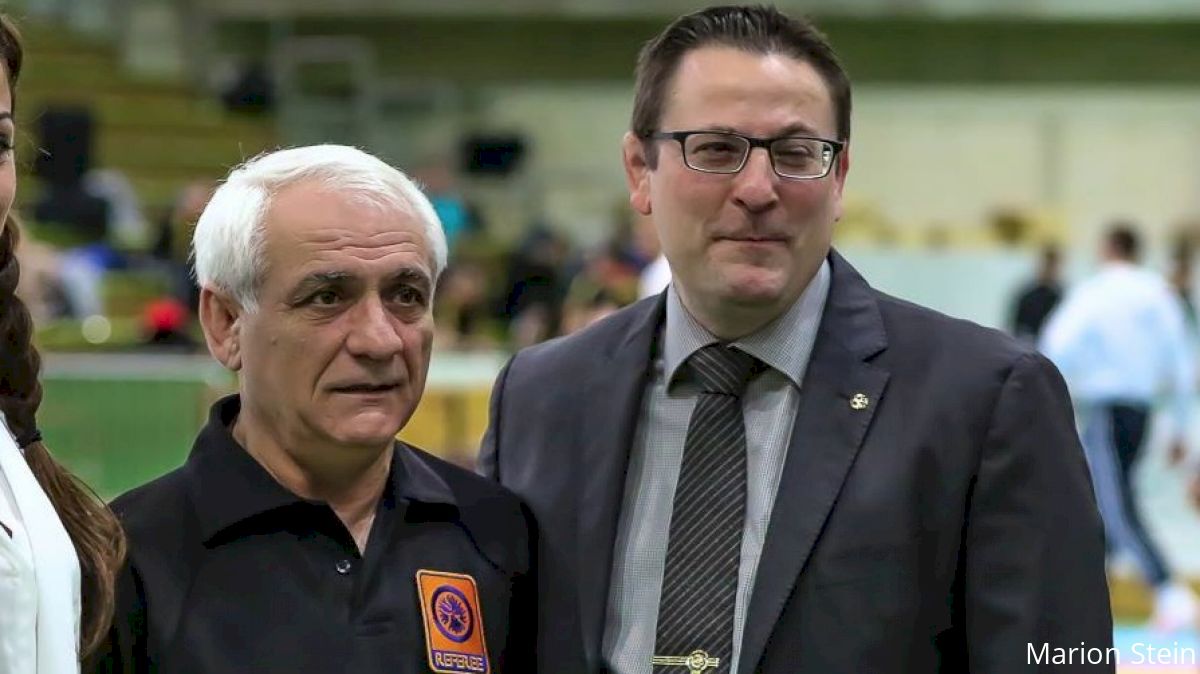
Temo Kazarashvili (left) and United World Wrestling's Chief Referee Antonio Silvestri (right) were instrumental in the corruption throughout the wrestling portion of the Olympic Games.
Doping, thrown bouts, and match fixing.
Unfortunately, international wrestling is never short on allegations -- what's been missing is evidence.
That all changed in the fallout from the 2016 Olympic Games. The quality of officiating observed can't be so easily dismissed as run-of-the-mill bad refereeing or a collection of missed calls.
It was corruption orchestrated by United World Wrestling Chief Referee Antonio Silvestri.
While few can believe Silvestri, a German, crafted a scheme that benefitted Russia, Uzbekistan and Azerbaijan by himself, a FloWrestling review of the officiating assignments shows he certainly acquiesced to whatever coercion was applied.
How They Did It
Silvestri, who has not responded to multiple requests for comment by FloWrestling, is the one man tasked with assigning officiating crews to different matches.
This process is supposed to be done without bias or consideration of country, and the lone exception is that no official may be on the mat for their own country.
What you will find is Silvestri's unthinkable, yet transparent, attempt at rigging the outcomes of matches by predetermining the assignments of certain officials to work three countries at a rate that is beyond what could be considered coincidence.
The two most thinly veiled instances of rigged calls during the Olympic Games involved bouts between Iran's Reza Yazdani and Azerbaijan's Khetag Gazyumov at 97kg and Puerto Rico's Franklin Gomez and Uzbekistan's Ikhtiyor Navruzov at 65kg.
In an egregious call, officials Konstantin Mikhaylov (Uzbekistan) and Temo Kazarashvili (Georgia) both white paddled the takedown for Yazdani in the 97kg match against Gayzumov. In on the act was Sergey Novakovskiy of Russia, who did not allow the takedown as the jury of review.
Fifteen minutes later, much of this same crew turned its misdeeds to the Navruzov/Gomez bout. The call was butchered by Tong-Kun Chung (South Korea), who changed his verdict three times. When he finally got on the same page as Kazarashvili, their bad call was once again upheld by Novakovskiy in the review.
1 Blue, the initial call by Chung.
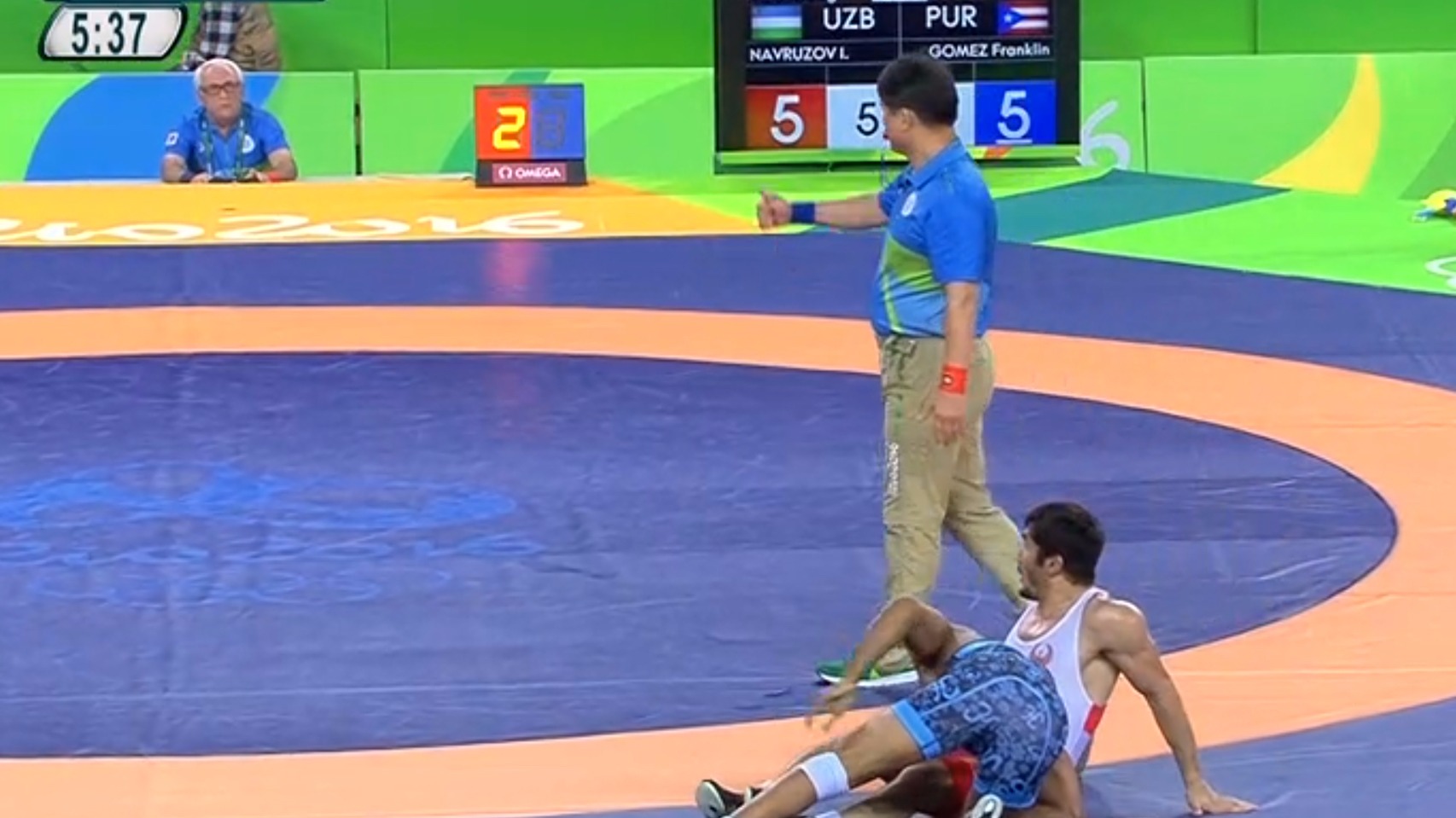
Then 2 blue?
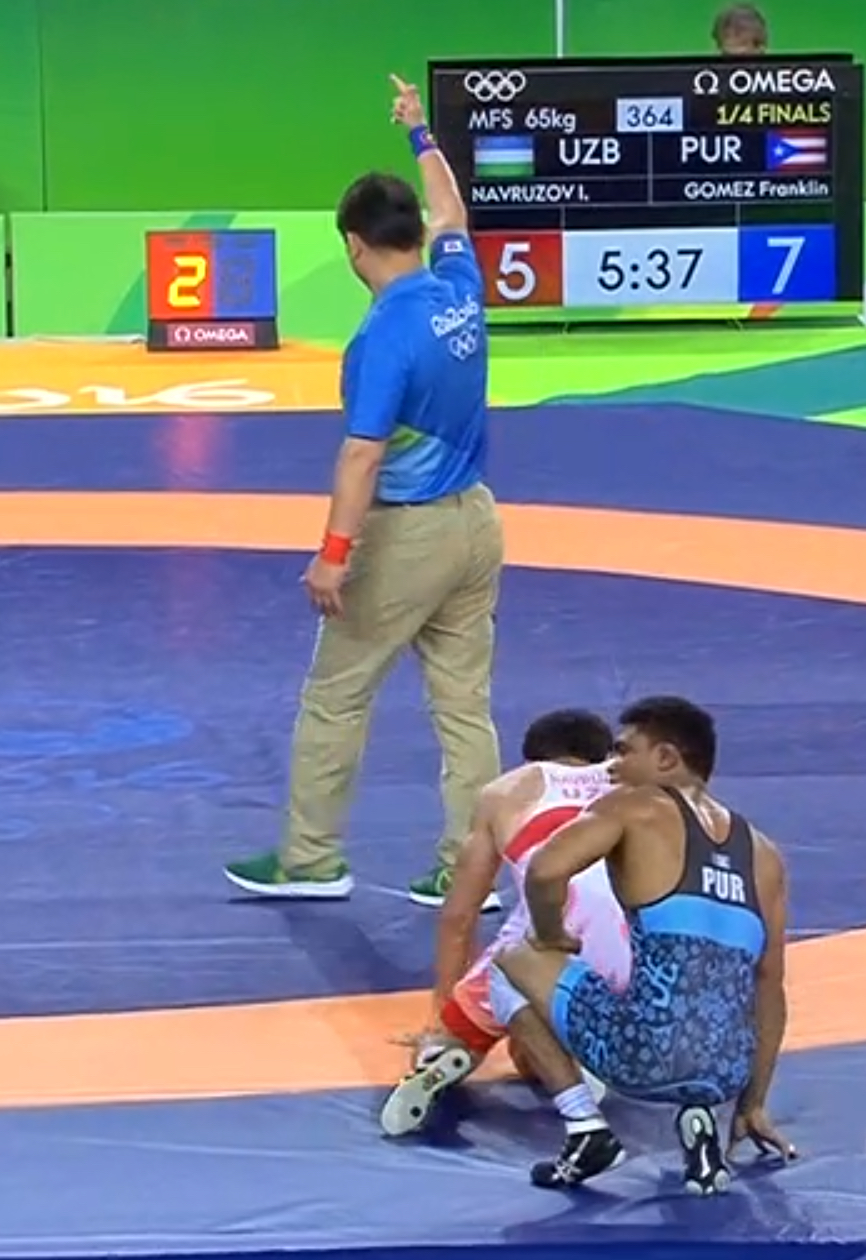
Now 2 red!
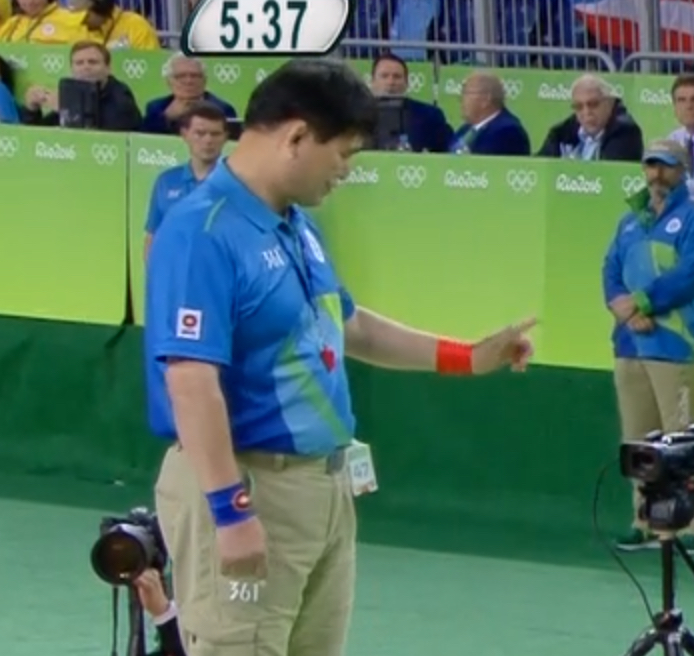
Novakoskiy blatantly ignores the right call twice as a juror and is seen preventing an honest juror from grabbing the blue paddle for Gomez.
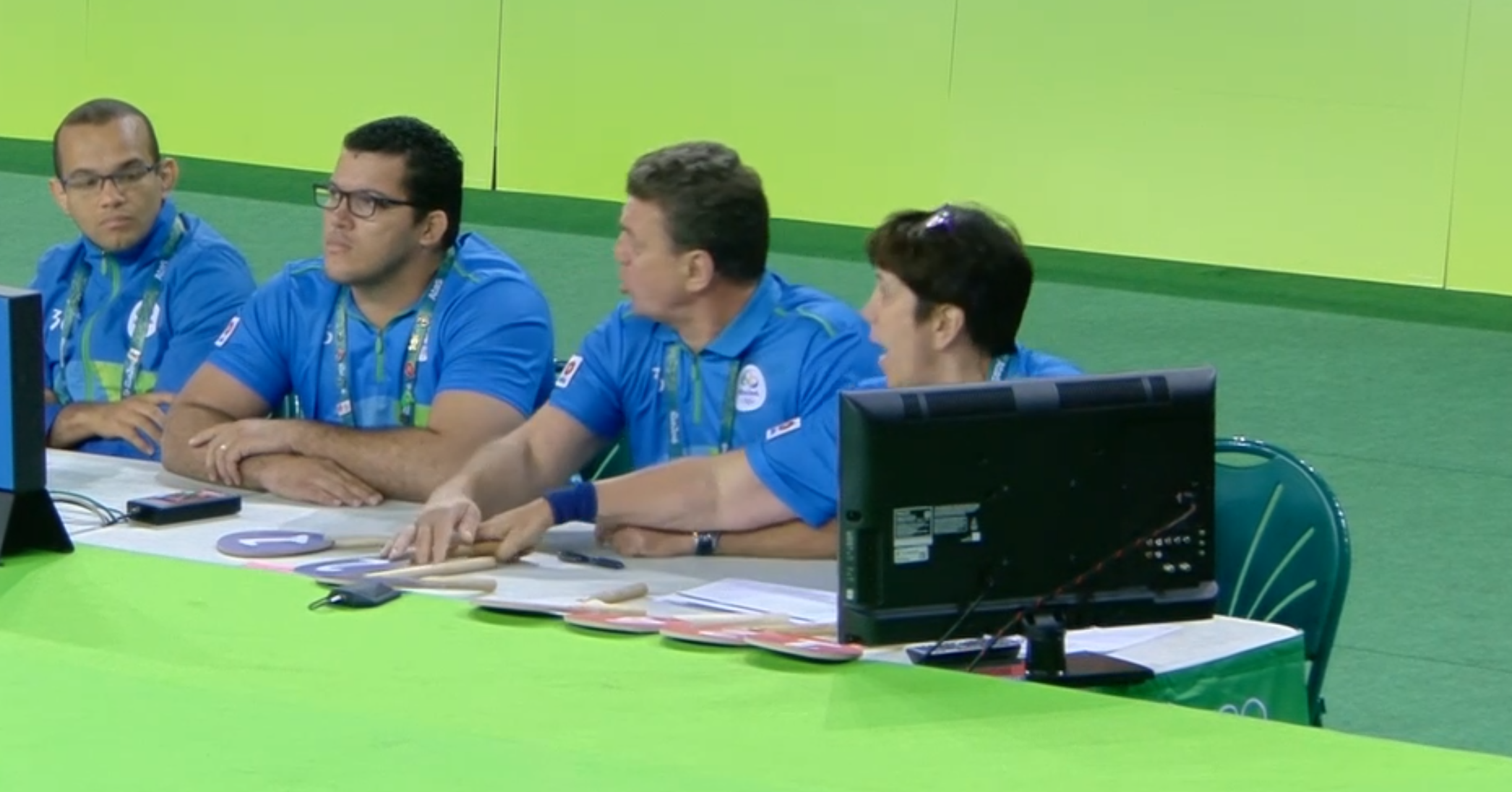
The Ejected Officials Statistics
All told, there are 10 officials whose usage is beyond just suspicious and is undeniable evidence of officiating corruption.
While many instances of corruption have already been observed and documented, what you'll see now is that the officials were not there by happenstance.
Editor's note: The numbers next to the officials names are their UWW assigned official number. Using the Olympic website, you can see the names for every official for each mat.
#47 Tong-Kun Chung, South Korea - Ejected
Chung was the official for Russia, Azerbaijan and/or Uzbekistan an incredible 53 percent of the time. Every time he was a chairman, there was a Russian on the mat. For all of Uzbekistan's matches, Chung was on the call 15 percent of the time. Chung was disqualified following the Navruzov/Gomez match.
#45 Temo Kazarashvili, Georgia - Ejected
While Kazarashvili's involvement wasn't statistically as rampant as a few others, the Georgian was still involved with an implicated country at a 50 percent clip.
Additionally, his usage during two bouts that included Davit Chakvetadze, who wrestles for Russia but is of Georgian descent, coupled with his blatant ignorance of the UWW rule set, points a clear picture that Kazarashvili was among the corrupted. Silvestri would ultimately disqualify Kazarashvili following the Navruzov/Gomez swindle.
Kazarashvili theatrically advocates for the incorrect call in the Gomez/Navruzov bout.
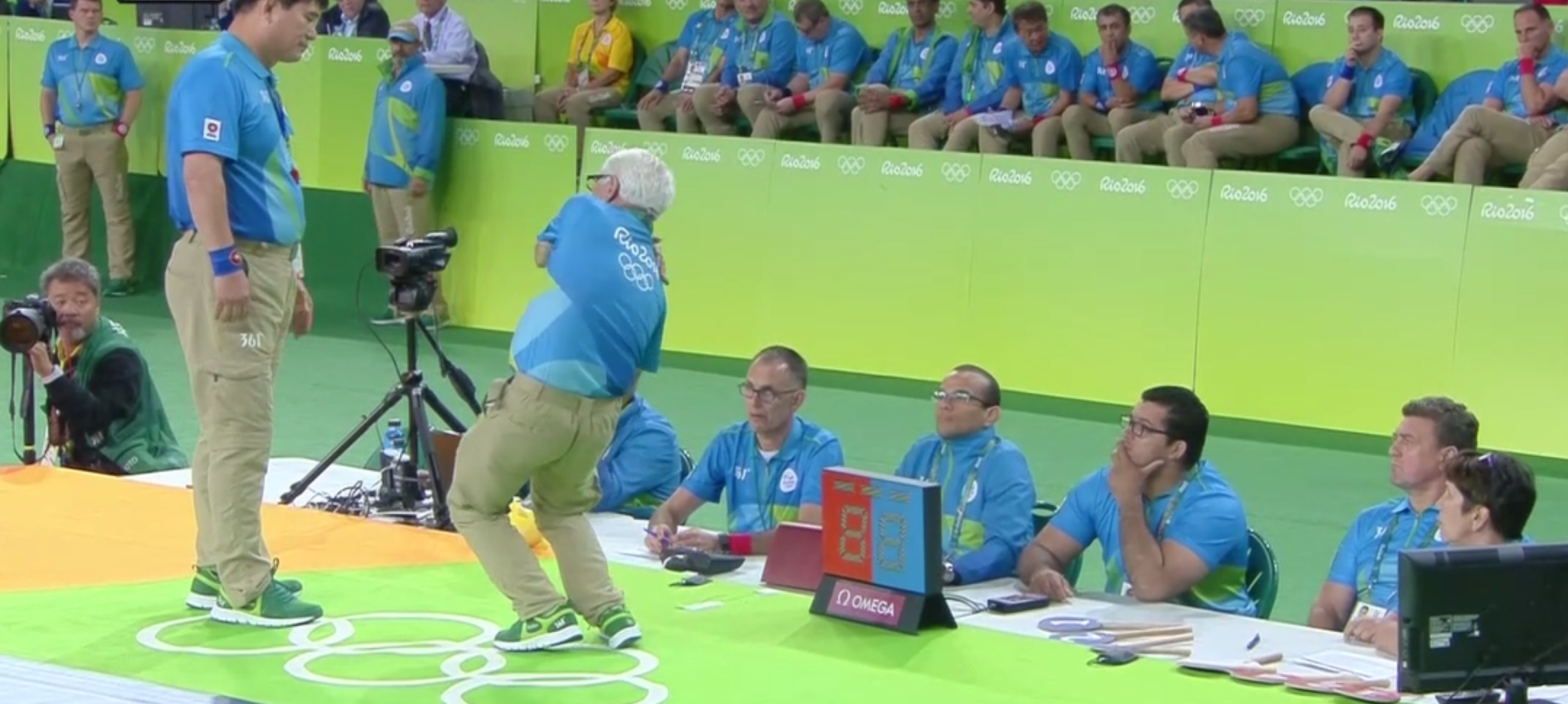
#14 Sergey Novakovskiy, Russia - Ejected
While Novakovskiy was only a juror for Azerbaijan and Uzbekistan 20 percent of the time, he changed the outcomes of at least two of those bouts. He negated his fellow jury member in both the Navruzov/Gomez and the Yazdani/Gazyumov matches.
Novakovskiy (Left) ignores the blatant takedown by Reza Yazdani, to the chagrin of fellow juror Zach Errett, who signals for 2.
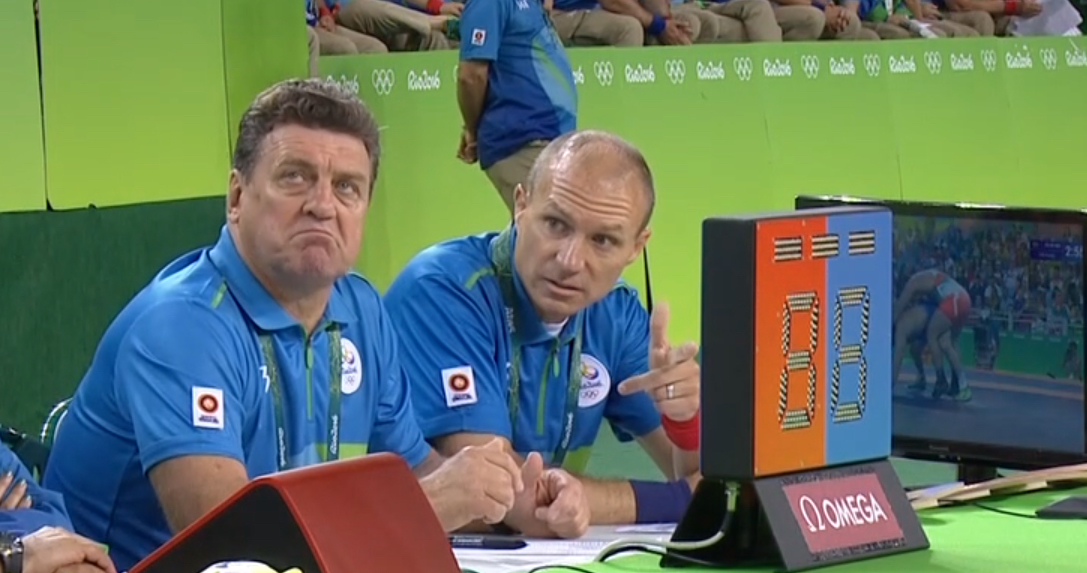
The Additional Implicated
The realization and acknowledgement of these patterns takes you down a black hole of blatant corruption.
We found even more beyond the initial patterns of ejected officials.
#29 Ihar Brel, Belarus
When Brel was a judge, 85 percent of those bouts involved Russia, Azerbaijan and/or Uzbekistan. When Brel was an official, 53 percent of those matches involved the three countries. He was the referee for 20 percent of all Uzbekistan matches. Of the nine matches he was involved with in MFS, eight featured the three countries.
#35 Kochkor Kulmatov, Kyrgyzstan
Kulmatov officiated 11 bouts for men's freestyle. Ten of those bouts involved Russia, Uzbekistan and Azerbaijan. This cannot happen in an appropriately random mat assignment.
As an example, highly regarded American official Sammy Julian officiated eight matches in men's freestyle. None of his eight matches involved an implicated country. This is in stark contrast to Kulmatov's 10 out of 11 matches with implicated countries.
Brel and Kulmatov appear to have been a team for the purposes of the conspiracy. They were paired up as ref and judge six times, all of which were for the three countries. They were also paired together in a completely flabbergasting way. First, a five-person combination hitting twice does not happen. Second, if it does, they don't have the same specific jobs. Third, they won't happen in the same style, in the same round, and for the same country!
The grouping was referee Brel (Belarus), judge Kulmatov (Kyrgyzstan), chair Andrey Krikov (Russia), Jury 1 Bakhytzhan Jaxykulov (Kazakhstan) and Jury 2 Noreddine Mochaffaa (Morocco). While Jaxykulov is not implicated, it is impossible that this same group would be seen twice in two days.
#5 Edisher Machaidze, Georgia
Machaidze was involved in 31 matches for Greco Roman. Of those matches, 18 involved a combination of Russia, Azerbaijan, and Uzbekistan. Machaidze only officiated 13 matches that did not involve those three countries.
In men's freestyle, Machaidze officiated in 15 of the 43 total matches (35 percent) wrestled by Russia, Azerbaijan and Uzbekistan. Of the 90 bouts wrestled by other countries, Machaidze only officiated 18 percent.
#12 Konstantin Mikhaylov, Uzbekistan
Mikhaylov was the chairman for the Yazdani/Gazyumov bout. He was the official for 10 percent of all Azerbaijan matches. The only official who was involved at a higher rate of Azerbaijani bouts was Stanislav Sernek.
Mikhaylov also officiated high-profile bouts, including the quarterfinal between Georgia's Vladimer Khinchegashvili and Azerbaijan's Haji Aliyev as well as the bronze medal match featuring Belarus' Vladimir Dubov and Aliyev.
#15 Uwe Manz, Germany
Of the bouts Manz refereed, 83 percent involved Russia, Uzbekistan and/or Azerbaijan. In 48 percent of the matches, he was the chairman involved with those same three countries. For all of Azerbaijan's matches, Manz was the chair for 20 percent of the bouts and for Uzbekistan it was 15 percent.
Manz was used in 52 matches, 40 of which he appeared as the chairman. Between MFS and GR, he was the chairman 26 times; 12 for UZB/RUS/AZE matches and 14 times otherwise.
On the surface, one could view these assignments and think that he is in cahoots with the dirty officials. However, Germany's Manz is considered one of the best officials in the world, and he was awarded the "Golden Whistle" by UWW after the Olympics.
The purpose of using him as a chairman is to essentially neuter his effectiveness in negating bad calls. It is also likely he is not the only patsy in the scheme, though Manz is the most high-profile.
#10 Noreddine Mochaffaa, Morocco
Of the 42 matches that Russia, Azerbaijan and Uzbekistan wrestled in Greco Roman, Mochaffaa was on the jury in 25 of those matches, or 60 percent of the time. For all other countries' 94 matches, he was only on the jury for 13 bouts (14 percent).
Of the 43 men's freestyle matches involving the three implicated countries, Mochaffa was on the jury for 20 of them (47 percent). For all other countries, he was just involved just 21 percent of the time.
Incredibly, Mochaffaa and the aforementioned Machaidze were on the jury for 83 percent of all Russia, Azerbaijan and Uzbekistan matches for men's freestyle.
The same was true for Greco Roman. Machaidze or Mochaffaa was on the jury for 74 percent of all of the three countries' matches. That said, Mochaffaa may also be a well-placed decoy in the scheme. Since he was a jury member and only involved when a call was challenged, there are not enough action points to say for certain that Mochaffaa was complicit in the scheme.
#27 Stanislav Sernek, Slovenia
Of the 19 matches Sernek was involved with during men's freestyle, 14 of those involved an implicated country. Of note, he was also part of the refereeing body when the Mongolian coaches displayed their distrust in the system after Mandakhnaran Ganzorig (65kg) lost his bout on a caution point in the closing seconds.
A particularly damning stat for Sernek is that he was the chairman for Russia's Abdulrashid Sadulaev three times. No other athlete in MFS had the same chairman three times. Considering there were 11 chairmen used in the 22 matches at 86kg, the odds of this happening are extremely low.
#8 Andrey Krikov, Russia
Krikov was the mat chairman for Azerbaijan in 24 percent of their bouts. A closer look reveals Krikov was the chairman in back-to-back bouts with Jabril Hasanov (AZE).
Additionally he was on the mat for both Sharif Sharifov's (AZE) and Gazyumov's (AZE) quarterfinal matches. Quarterfinal bouts are paramount in international wrestling as a win in the quarters guarantees a medal match. He was the chairman for 22 percent of all Azerbaijan matches and 20 percent of all Uzbekistan matches.
#17 Hirjan Sharifov, Azerbaijan
Of the matches he officiated, 50 percent of them involved Russia and Uzbekistan. He officiated 14 percent of all of Russia's matches.
Think of them as ushers, tasked with aiding certain countries to the next round.
A careful review of the implicated officials shows that the round with the most chicanery was the quarterfinals. While the round is still early enough that fewer eyes will be on it, a quarterfinal win guarantees a chance to wrestle for a medal -- presumably the goal of this scheme for Russia, Azerbaijan, and Uzbekistan.
In the event of a questionable call, a corrupted staff would need two out of three members to have a questionable call go in the favor of a certain wrestler. This type of combination could be found in the Aliyev (AZE), Sharifov (AZE), and Gazyumov (AZE) quarters for MFS. On the Greco side, it was used for the quarters of Elmurat Tasmuradov (UZB), Rasul Chunayev (AZE), Roman Vlasov (RUS), Elvin Mursaliev (AZE), and Chakvetadze (RUS).
Khetag Gazyumov, Azerbaijan
Gazyumov's run is wrought with implicated officials from start to finish. In his five matches, he saw Kulmatov three times and Brel three times. Mochaffaa was on his jury for the quarters, semis and finals. Additionally, Sernek was the ref for both his semifinal and the gold medal match.
All told, Gazyumov saw 15 different officials out of 25. Of those 15, nine of them are implicated in the officiating scandal. Each of his matches featured at least three implicated officials. The intent of this officiating orchestration was revealed in Gazyumov's quarterfinal against Yazdani.
Compare that with Kyle Snyder, who saw 17 different officials out of a possible 20 in his four matches. The only overlap was that he had Osamu Saito [4] twice as a judge. Snyder had Levant Sen twice, once as a ref and once as a chairman, and he had Edit Dozsa twice, once as a jury member and once as a chairman.
When the matches are reviewed at the same time, it is obvious Silvestri orchestrated a helpful path to the finals for Azerbaijan.
Davit Chakvatadze, Russia
Another wrestler who had a yellow brick road laid for him to the final was Chakvetadze. In his first four matches, the 85kg Greco champion had Mochaffaa four times as a juror, which is a number so astronomically low (0.077 percent of the time) it shouldn't happen even over the course of multiple tournaments. Chakvetadze also saw Sernek twice as a chairman, Brel twice, and Kulmatov twice.
Not only are the sheer numbers damning, what absolutely cannot be excused is the use of Kazarashvili as the referee in two of Chakvetadze's matches. Kazarashvili is a Georgian ref, and Chakvetadze has Georgian roots. There is no possible way Silvestri missed this fact.
The two matches Kazarashvili was assigned to ref were crucial ones for Chakvetadze: his quarterfinal, which guaranteed him the right to wrestle for a medal if he won, and the gold medal match. Considering the power the on-mat ref has in terms of stopping par terre, it is an immensely valuable position to hold in a Greco-Roman match.
Haji Aliyev (AZE) vs Vladimer Khinchegashvili (GEO)
In this match, four of the five implicated officials were involved, including Chung, Mikhaylov, Mochaffaa and Novakoskiy. When you watch the match, the stink of corruption becomes undeniable. In spite of the clear bias towards Azerbaijan's Aliyev, Georgia's Khinchegashvili still managed to get his hand raised.
In the beginning of the second period, Aliyev took a leg attack, and Khinchegashvili threw him by for the counter TD. Chung blew the whistle to put them up! It can only be guessed, but let's assume he attempted to call a slip. Chung likely should have been ejected immediately following this match.
Clear takedown by Khinchegashvili waved off by Chung.
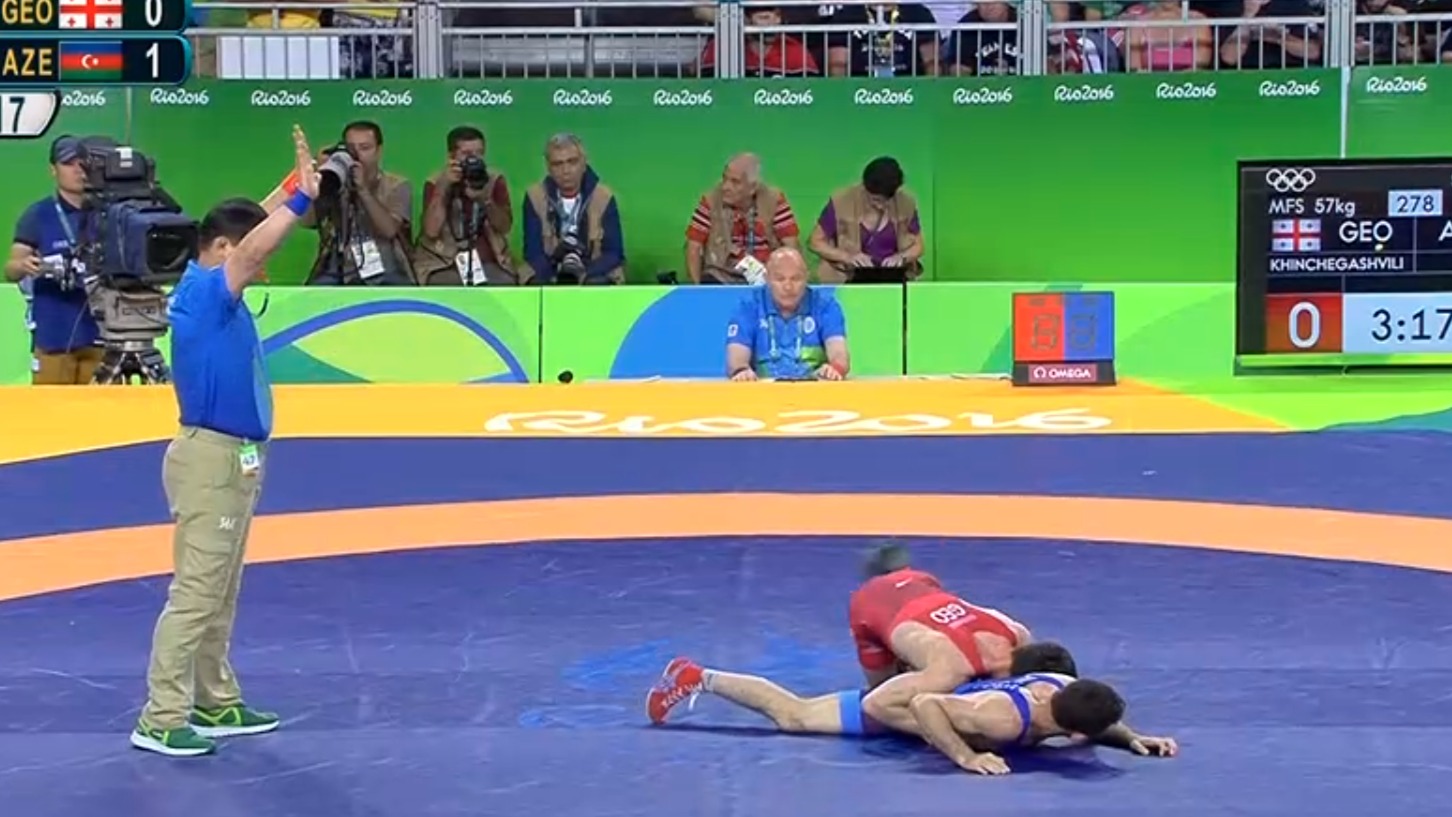
Later in the match, Aliyev got a takedown and immediately asked to be put back up neutral (not wanting to spend time getting a turn on par terre) to which Chung obliged. The top wrestler is not supposed to be able to make this determination. This time on top is typically around 15 seconds in freestyle, but Chung, eager to assist Aliyev, immediately put the two neutral.
Aliyev allowed to get up three seconds after takedown.
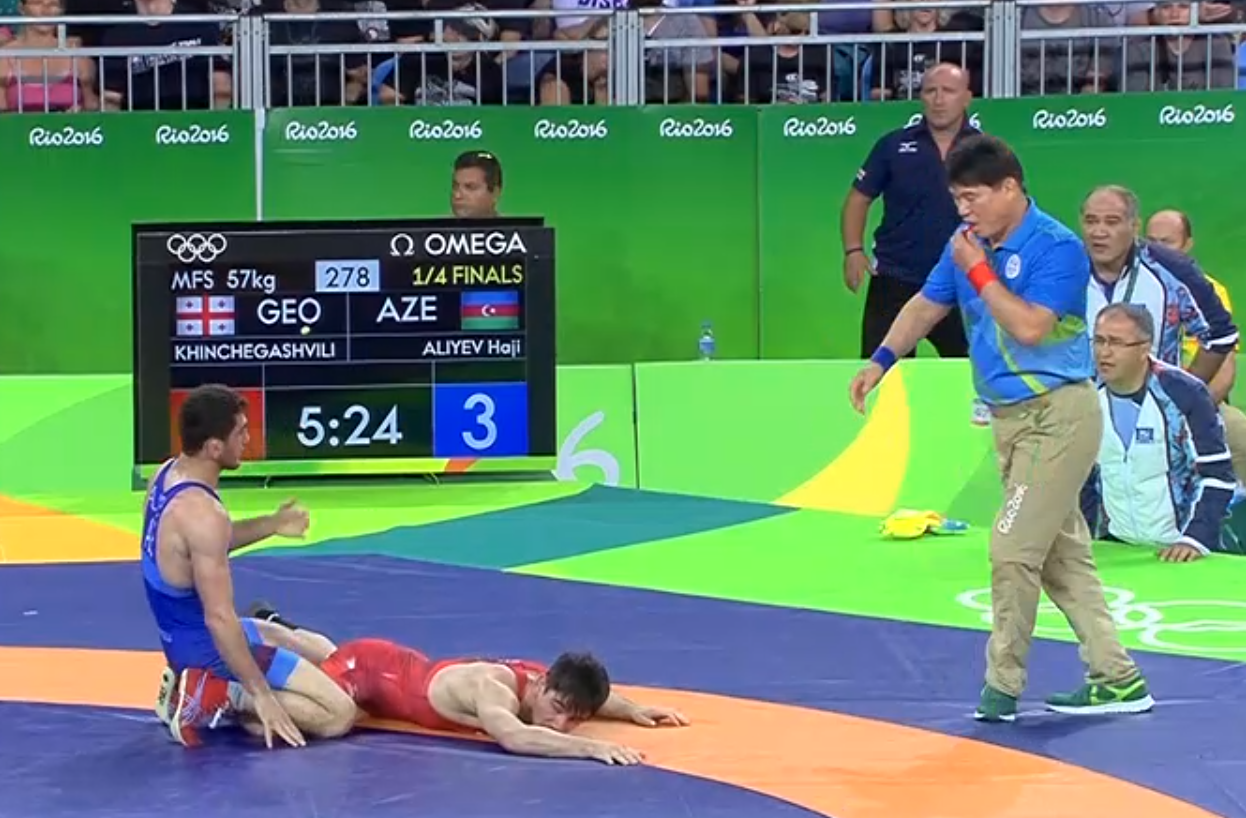
Conclusion
These findings merely scratch the surface of the corruption created by Silvestri at the Olympic Games. With more time and statistical analysis, many more conclusions can be drawn.
What is undeniable is that Silvestri, the man tasked with ensuring fairness and equity for wrestlers, went out of his way to set the antithesis into motion. The question that follows is "why?"
Why would a German official, who rose to the rank of chief referee by earning widespread trust of the international wrestling community, suddenly jeopardize the integrity of the sport and himself? One can safely assume that Silvestri succumbed to pressures from much higher powers.
It is incumbent upon United World Wrestling's leadership to use the findings like these to confront and remove the criminals within its ranks. Given the watchful eye placed on wrestling as it pertains to the Olympic program, the sport's future may rely on an appropriate response from the UWW.
-- Dan Lobdell and Andrew Spey contributed to this report. For a deeper look at some of the most troubling and baffling stats pertaining to official usage, go here.
Doping, thrown bouts, and match fixing.
Unfortunately, international wrestling is never short on allegations -- what's been missing is evidence.
That all changed in the fallout from the 2016 Olympic Games. The quality of officiating observed can't be so easily dismissed as run-of-the-mill bad refereeing or a collection of missed calls.
It was corruption orchestrated by United World Wrestling Chief Referee Antonio Silvestri.
While few can believe Silvestri, a German, crafted a scheme that benefitted Russia, Uzbekistan and Azerbaijan by himself, a FloWrestling review of the officiating assignments shows he certainly acquiesced to whatever coercion was applied.
How They Did It
Silvestri, who has not responded to multiple requests for comment by FloWrestling, is the one man tasked with assigning officiating crews to different matches. This process is supposed to be done without bias or consideration of country, and the lone exception is that no official may be on the mat for their own country.
What you will find is Silvestri's unthinkable, yet transparent, attempt at rigging the outcomes of matches by predetermining the assignments of certain officials to work three countries at a rate that is beyond what could be considered coincidence.
The two most thinly veiled instances of rigged calls during the Olympic Games involved bouts between Iran's Reza Yazdani and Azerbaijan's Khetag Gazyumov at 97kg and Puerto Rico's Franklin Gomez and Uzbekistan's Ikhtiyor Navruzov at 65kg.
In an egregious call, officials Konstantin Mikhaylov (Uzbekistan) and Temo Kazarashvili (Georgia) both white paddled the takedown for Yazdani in the 97kg match against Gayzumov. In on the act was Sergey Novakovskiy of Russia, who did not allow the takedown as the jury of review.
Fifteen minutes later, much of this same crew turned its misdeeds to the Navruzov/Gomez bout. The call was butchered by Tong-Kun Chung (South Korea), who changed his verdict three times. When he finally got on the same page as Kazarashvili, their bad call was once again upheld by Novakovskiy in the review.
1 Blue, the initial call by Chung.

Then 2 blue?

Now 2 red!

Novakoskiy blatantly ignores the right call twice as a juror and is seen preventing an honest juror from grabbing the blue paddle for Gomez.

The Ejected Officials Statistics
All told, there are 10 officials whose usage is beyond just suspicious and is undeniable evidence of officiating corruption. While many instances of corruption have already been observed and documented, what you'll see now is that the officials were not there by happenstance.
Editor's note: The numbers next to the officials names are their UWW assigned official number. Using the Olympic website, you can see the names for every official for each mat.
#47 Tong-Kun Chung, South Korea - Ejected
Chung was the official for Russia, Azerbaijan and/or Uzbekistan an incredible 53 percent of the time. Every time he was a chairman, there was a Russian on the mat. For all of Uzbekistan's matches, Chung was on the call 15 percent of the time. Chung was disqualified following the Navruzov/Gomez match. #45 Temo Kazarashvili, Georgia - Ejected
While Kazarashvili's involvement wasn't statistically as rampant as a few others, the Georgian was still involved with an implicated country at a 50 percent clip. Additionally, his usage during two bouts that included Davit Chakvetadze, who wrestles for Russia but is of Georgian descent, coupled with his blatant ignorance of the UWW rule set, points a clear picture that Kazarashvili was among the corrupted. Silvestri would ultimately disqualify Kazarashvili following the Navruzov/Gomez swindle.
Kazarashvili theatrically advocates for the incorrect call in the Gomez/Navruzov bout.

#14 Sergey Novakovskiy, Russia - Ejected
While Novakovskiy was only a juror for Azerbaijan and Uzbekistan 20 percent of the time, he changed the outcomes of at least two of those bouts. He negated his fellow jury member in both the Navruzov/Gomez and the Yazdani/Gazyumov matches.Novakovskiy (Left) ignores the blatant takedown by Reza Yazdani, to the chagrin of fellow juror Zach Errett, who signals for 2.

The Additional Implicated
The realization and acknowledgement of these patterns takes you down a black hole of blatant corruption. We found even more beyond the initial patterns of ejected officials.
#29 Ihar Brel, Belarus
When Brel was a judge, 85 percent of those bouts involved Russia, Azerbaijan and/or Uzbekistan. When Brel was an official, 53 percent of those matches involved the three countries. He was the referee for 20 percent of all Uzbekistan matches. Of the nine matches he was involved with in MFS, eight featured the three countries.#35 Kochkor Kulmatov, Kyrgyzstan
Kulmatov officiated 11 bouts for men's freestyle. Ten of those bouts involved Russia, Uzbekistan and Azerbaijan. This cannot happen in an appropriately random mat assignment. As an example, highly regarded American official Sammy Julian officiated eight matches in men's freestyle. None of his eight matches involved an implicated country. This is in stark contrast to Kulmatov's 10 out of 11 matches with implicated countries.
Brel and Kulmatov appear to have been a team for the purposes of the conspiracy. They were paired up as ref and judge six times, all of which were for the three countries. They were also paired together in a completely flabbergasting way. First, a five-person combination hitting twice does not happen. Second, if it does, they don't have the same specific jobs. Third, they won't happen in the same style, in the same round, and for the same country!
The grouping was referee Brel (Belarus), judge Kulmatov (Kyrgyzstan), chair Andrey Krikov (Russia), Jury 1 Bakhytzhan Jaxykulov (Kazakhstan) and Jury 2 Noreddine Mochaffaa (Morocco). While Jaxykulov is not implicated, it is impossible that this same group would be seen twice in two days.
#5 Edisher Machaidze, Georgia
Machaidze was involved in 31 matches for Greco Roman. Of those matches, 18 involved a combination of Russia, Azerbaijan, and Uzbekistan. Machaidze only officiated 13 matches that did not involve those three countries. In men's freestyle, Machaidze officiated in 15 of the 43 total matches (35 percent) wrestled by Russia, Azerbaijan and Uzbekistan. Of the 90 bouts wrestled by other countries, Machaidze only officiated 18 percent.
#12 Konstantin Mikhaylov, Uzbekistan
Mikhaylov was the chairman for the Yazdani/Gazyumov bout. He was the official for 10 percent of all Azerbaijan matches. The only official who was involved at a higher rate of Azerbaijani bouts was Stanislav Sernek. Mikhaylov also officiated high-profile bouts, including the quarterfinal between Georgia's Vladimer Khinchegashvili and Azerbaijan's Haji Aliyev as well as the bronze medal match featuring Belarus' Vladimir Dubov and Aliyev.
#15 Uwe Manz, Germany
Of the bouts Manz refereed, 83 percent involved Russia, Uzbekistan and/or Azerbaijan. In 48 percent of the matches, he was the chairman involved with those same three countries. For all of Azerbaijan's matches, Manz was the chair for 20 percent of the bouts and for Uzbekistan it was 15 percent.Manz was used in 52 matches, 40 of which he appeared as the chairman. Between MFS and GR, he was the chairman 26 times; 12 for UZB/RUS/AZE matches and 14 times otherwise.
On the surface, one could view these assignments and think that he is in cahoots with the dirty officials. However, Germany's Manz is considered one of the best officials in the world, and he was awarded the "Golden Whistle" by UWW after the Olympics.
The purpose of using him as a chairman is to essentially neuter his effectiveness in negating bad calls. It is also likely he is not the only patsy in the scheme, though Manz is the most high-profile.
#10 Noreddine Mochaffaa, Morocco
Of the 42 matches that Russia, Azerbaijan and Uzbekistan wrestled in Greco Roman, Mochaffaa was on the jury in 25 of those matches, or 60 percent of the time. For all other countries' 94 matches, he was only on the jury for 13 bouts (14 percent). Of the 43 men's freestyle matches involving the three implicated countries, Mochaffa was on the jury for 20 of them (47 percent). For all other countries, he was just involved just 21 percent of the time.
Incredibly, Mochaffaa and the aforementioned Machaidze were on the jury for 83 percent of all Russia, Azerbaijan and Uzbekistan matches for men's freestyle.
The same was true for Greco Roman. Machaidze or Mochaffaa was on the jury for 74 percent of all of the three countries' matches. That said, Mochaffaa may also be a well-placed decoy in the scheme. Since he was a jury member and only involved when a call was challenged, there are not enough action points to say for certain that Mochaffaa was complicit in the scheme.
#27 Stanislav Sernek, Slovenia
Of the 19 matches Sernek was involved with during men's freestyle, 14 of those involved an implicated country. Of note, he was also part of the refereeing body when the Mongolian coaches displayed their distrust in the system after Mandakhnaran Ganzorig (65kg) lost his bout on a caution point in the closing seconds. A particularly damning stat for Sernek is that he was the chairman for Russia's Abdulrashid Sadulaev three times. No other athlete in MFS had the same chairman three times. Considering there were 11 chairmen used in the 22 matches at 86kg, the odds of this happening are extremely low.
#8 Andrey Krikov, Russia
Krikov was the mat chairman for Azerbaijan in 24 percent of their bouts. A closer look reveals Krikov was the chairman in back-to-back bouts with Jabril Hasanov (AZE). Additionally he was on the mat for both Sharif Sharifov's (AZE) and Gazyumov's (AZE) quarterfinal matches. Quarterfinal bouts are paramount in international wrestling as a win in the quarters guarantees a medal match. He was the chairman for 22 percent of all Azerbaijan matches and 20 percent of all Uzbekistan matches.
#17 Hirjan Sharifov, Azerbaijan
Of the matches he officiated, 50 percent of them involved Russia and Uzbekistan. He officiated 14 percent of all of Russia's matches.Laying Out a Path
You've seen the incredible numbers, you've seen the rigged matches, and now you'll see how these crews were placed for different athletes.Think of them as ushers, tasked with aiding certain countries to the next round.
A careful review of the implicated officials shows that the round with the most chicanery was the quarterfinals. While the round is still early enough that fewer eyes will be on it, a quarterfinal win guarantees a chance to wrestle for a medal -- presumably the goal of this scheme for Russia, Azerbaijan, and Uzbekistan.
In the event of a questionable call, a corrupted staff would need two out of three members to have a questionable call go in the favor of a certain wrestler. This type of combination could be found in the Aliyev (AZE), Sharifov (AZE), and Gazyumov (AZE) quarters for MFS. On the Greco side, it was used for the quarters of Elmurat Tasmuradov (UZB), Rasul Chunayev (AZE), Roman Vlasov (RUS), Elvin Mursaliev (AZE), and Chakvetadze (RUS).
Khetag Gazyumov, Azerbaijan
Gazyumov's run is wrought with implicated officials from start to finish. In his five matches, he saw Kulmatov three times and Brel three times. Mochaffaa was on his jury for the quarters, semis and finals. Additionally, Sernek was the ref for both his semifinal and the gold medal match. All told, Gazyumov saw 15 different officials out of 25. Of those 15, nine of them are implicated in the officiating scandal. Each of his matches featured at least three implicated officials. The intent of this officiating orchestration was revealed in Gazyumov's quarterfinal against Yazdani.
Compare that with Kyle Snyder, who saw 17 different officials out of a possible 20 in his four matches. The only overlap was that he had Osamu Saito [4] twice as a judge. Snyder had Levant Sen twice, once as a ref and once as a chairman, and he had Edit Dozsa twice, once as a jury member and once as a chairman.
When the matches are reviewed at the same time, it is obvious Silvestri orchestrated a helpful path to the finals for Azerbaijan.
Davit Chakvatadze, Russia
Another wrestler who had a yellow brick road laid for him to the final was Chakvetadze. In his first four matches, the 85kg Greco champion had Mochaffaa four times as a juror, which is a number so astronomically low (0.077 percent of the time) it shouldn't happen even over the course of multiple tournaments. Chakvetadze also saw Sernek twice as a chairman, Brel twice, and Kulmatov twice. Not only are the sheer numbers damning, what absolutely cannot be excused is the use of Kazarashvili as the referee in two of Chakvetadze's matches. Kazarashvili is a Georgian ref, and Chakvetadze has Georgian roots. There is no possible way Silvestri missed this fact.
The two matches Kazarashvili was assigned to ref were crucial ones for Chakvetadze: his quarterfinal, which guaranteed him the right to wrestle for a medal if he won, and the gold medal match. Considering the power the on-mat ref has in terms of stopping par terre, it is an immensely valuable position to hold in a Greco-Roman match.
Haji Aliyev (AZE) vs Vladimer Khinchegashvili (GEO)
In this match, four of the five implicated officials were involved, including Chung, Mikhaylov, Mochaffaa and Novakoskiy. When you watch the match, the stink of corruption becomes undeniable. In spite of the clear bias towards Azerbaijan's Aliyev, Georgia's Khinchegashvili still managed to get his hand raised. In the beginning of the second period, Aliyev took a leg attack, and Khinchegashvili threw him by for the counter TD. Chung blew the whistle to put them up! It can only be guessed, but let's assume he attempted to call a slip. Chung likely should have been ejected immediately following this match.
Clear takedown by Khinchegashvili waved off by Chung.

Later in the match, Aliyev got a takedown and immediately asked to be put back up neutral (not wanting to spend time getting a turn on par terre) to which Chung obliged. The top wrestler is not supposed to be able to make this determination. This time on top is typically around 15 seconds in freestyle, but Chung, eager to assist Aliyev, immediately put the two neutral.
Aliyev allowed to get up three seconds after takedown.

Conclusion
These findings merely scratch the surface of the corruption created by Silvestri at the Olympic Games. With more time and statistical analysis, many more conclusions can be drawn.What is undeniable is that Silvestri, the man tasked with ensuring fairness and equity for wrestlers, went out of his way to set the antithesis into motion. The question that follows is "why?"
Why would a German official, who rose to the rank of chief referee by earning widespread trust of the international wrestling community, suddenly jeopardize the integrity of the sport and himself? One can safely assume that Silvestri succumbed to pressures from much higher powers.
It is incumbent upon United World Wrestling's leadership to use the findings like these to confront and remove the criminals within its ranks. Given the watchful eye placed on wrestling as it pertains to the Olympic program, the sport's future may rely on an appropriate response from the UWW.
-- Dan Lobdell and Andrew Spey contributed to this report. For a deeper look at some of the most troubling and baffling stats pertaining to official usage, go here.
Related Content
 125 lbs Final - Francisco Mendoza, West Point-Beemer vs Josh Velasquez, Bennington
125 lbs Final - Francisco Mendoza, West Point-Beemer vs Josh Velasquez, BenningtonApr 25, 2024
 125 lbs Final - Francisco Mendoza, West Point-Beemer vs Josh Velasquez, Bennington
125 lbs Final - Francisco Mendoza, West Point-Beemer vs Josh Velasquez, BenningtonApr 25, 2024
 125 lbs Final - Francisco Mendoza, West Point-Beemer vs Josh Velasquez, Bennington
125 lbs Final - Francisco Mendoza, West Point-Beemer vs Josh Velasquez, BenningtonApr 25, 2024
 Rising Star Steven Austin Disqualified Over In-Ring Alcohol Incident
Rising Star Steven Austin Disqualified Over In-Ring Alcohol IncidentApr 24, 2024
 125 lbs Final - Francisco Mendoza, West Point-Beemer vs Josh Velasquez, Bennington
125 lbs Final - Francisco Mendoza, West Point-Beemer vs Josh Velasquez, BenningtonApr 23, 2024
 125 lbs Final - Francisco Mendoza, West Point-Beemer vs Josh Velasquez, Bennington
125 lbs Final - Francisco Mendoza, West Point-Beemer vs Josh Velasquez, BenningtonApr 23, 2024
 125 lbs Final - Francisco Mendoza, West Point-Beemer vs Josh Velasquez, Bennington
125 lbs Final - Francisco Mendoza, West Point-Beemer vs Josh Velasquez, BenningtonApr 19, 2024
 125 lbs Final - Francisco Mendoza, West Point-Beemer vs Josh Velasquez, Bennington
125 lbs Final - Francisco Mendoza, West Point-Beemer vs Josh Velasquez, BenningtonApr 19, 2024
 125 lbs Final - Francisco Mendoza, West Point-Beemer vs Josh Velasquez, Bennington
125 lbs Final - Francisco Mendoza, West Point-Beemer vs Josh Velasquez, BenningtonApr 19, 2024